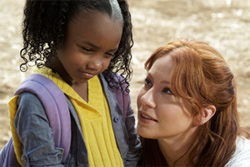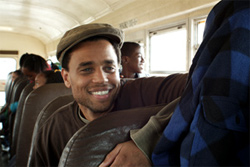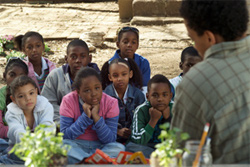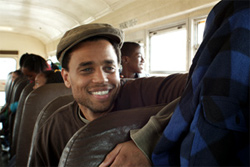The dramatic opening of Unconditional intercuts three perilous scenarios during a late night rainstorm. A woman suffering from depression sits in her car alone, preparing to shove a pistol into her mouth. An inner-city boy is shoplifting at a nearby store with his younger sister. And a man at home trembles as he scrambles to pump himself full of drugs.
But things are not quite as they appear. These ostensibly unconnected lives intersect much like 2006’s Best Picture Winner Crash. And this is actually a Christian film—a surprisingly good one, for that matter.

The woman, Samantha, is an up-and-coming children’s book author played by Lynn Collins (John Carter, X-Men Origins: Wolverine). The film’s effective prologue makes clever use of animation to explain how her husband Billy was killed in a street shooting, giving us the basics without showing the violence per se. In the months since, the grieving Sam has lost her faith and the will to live.
Preparing to kill herself, Sam hears screams down the street. A young girl, Keisha, has been hit by a car after chasing her older brother Macon into the street while fleeing the store he just robbed. Macon pleads for Sam to help, and she takes them to a nearby hospital.
Keisha ends up just fine, and the hospital calls one of the kids’ contacts, and it’s Joe (Barbershop‘s Michael Ealy), the man we saw supposedly shooting up in the first scene—when he was, in fact, working with a dialysis machine to treat a severe kidney disease. In the midst of his anguish, he prays for the safety of the kids, who are part of his inner-city youth group. It also turns out that Joe and Sam were close childhood friends, reconnecting through happenstance at the hospital.

These characters become more fleshed out as the story progresses. Joe lost a promising career due to pride and a prison sentence, lamenting what might have been if it weren’t for past mistakes and his kidney disease. Macon is a problem child destined for trouble due to a lack of strong parenting. Traumatized at an early age, Keisha hasn’t spoken in years and communicates only by notepad. It’s obvious what Sam struggles with, but as she gets to better know Joe and the kids he works with, she soon discovers that Macon and Keisha live next door to a man who may be connected to her husband’s murder.
Those are some of the general details revealed in Unconditional, and an astute filmgoer could probably guess how these tensions resolve. But then there are other scenes that may catch viewers off guard, maybe even wring some tears from cynical hearts.

What separates Unconditional from other Christian films is less a matter of what is in the story than how it is told. Having talented filmmakers and professional actors makes a huge difference in a movie like this. The actors pull off their performances with authenticity, especially Collins and Ealy, but even the inexperienced kids come across as cute and precocious without seeming overly clichéd.
Writer/director Brent McCorkle frames his shots well, making beautiful use of shadows and light in the city of Nashville, especially during that opening rainstorm. Inspired by true events (it’s based on Joe Bradford, who runs a real-life ministry to children in Nashville), the story effectively relies on flashbacks—Sam and Joe as children, Sam with her husband, Joe in prison—without ever muddling the storytelling; each scene establishes itself well. There’s even some well-staged action as shown in a brief prison fight.

And as the title implies, there is an underlying Christian message. It manages to demonstrate healing through love and forgiveness in ways both subtle and overt. For example, as with many films of this kind, Joe’s Christian testimony comes across a little simplistic—basically, “I was in solitary confinement and suddenly I found God!” In contrast, Sam’s children’s story about a bird trying to overcome the clouds makes a great little parable for anyone who’s weathered life’s storms. Though it isn’t a strong reference to God, those with ears to hear will find him in it, confirmed when Sam returns to the story’s metaphor again later in the film.
Unconditional takes that message of demonstrating love one step further through partnerships with local service organizations, and challenges moviegoers to help make a difference in their own communities—much like Joe does with his group of kids.
The film is, in ways, a cross between 2011’s The Grace Card and 2006’s The Second Chance. But improving on the former and taking a cue from the latter, Unconditional sets itself apart with quality filmmaking and redemptive storytelling delivered with authenticity—including realistic depictions of violence and certain thematic elements (thus the PG-13 rating). But such moments help make the lighter ones resonate more deeply, demonstrating how God’s unconditional love can shine when you least expect.
Talk About It
Discussion starters- Why do you think Joe wants to be a superhero/samurai as a boy? Does he become a “warrior” as an adult? What does it mean to be a hero? Does it always involve fighting in the way we understand it?
- Is Sam a warrior? How is she an example of the ripple effect that one good act can have on the lives of others? Aside from Sam, how does her husband’s death change the lives of others in the film? How is this an illustration of God working all things for good? (Romans 8:28)
- In what ways did Joe have an issue with pride in his younger days? How does pride prove to be his downfall? Explain why prison was good for Joe.
- Does Sam’s portrayal resonate with your understanding or experience of grief? What helps her overcome her depression? Why does God allow storms to come into our lives? How does pain bring a new way of seeing things in life?
- What’s the significance of the $2 bills? How does his willingness to love and help others get him killed? Do you think he was taking unnecessary risks in showing kindness? Why or why not?
- Recall Sam’s story of the bird looking for the sun amidst the clouds. How is it an apt metaphor/parable for God’s love? Explain how it relates to the title, using the film’s closing remarks if necessary. How is God’s love like the sun?
The Family Corner
For parents to considerUnconditional is rated PG-13 for some violent content and mature thematic elements. Though there is not profanity or overly graphic content, take the rating seriously. A brief prison fight gets a little brutal and involves some blood. There’s also a scene of pre-teens fighting. There are graphic bloody moments involving kidney dialysis. There are racial tensions (including a few references to “crackers”), depression due to the loss of a loved one, and a near suicide (a woman raises a gun to her mouth).
Photos © Harbinger Media Partners
© 2012 Christianity Today. All rights reserved. Click for reprint information.













